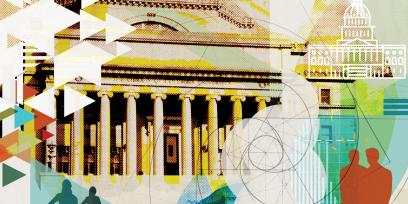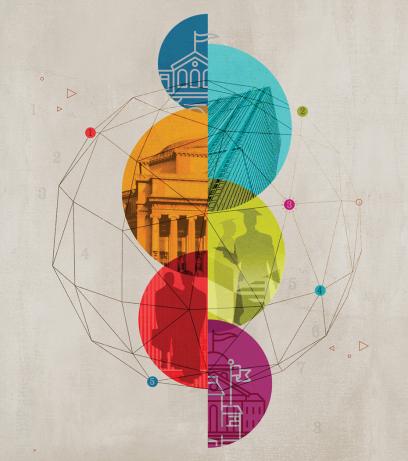“Knowledge,” as Francis Bacon observed in 1597 at the dawn of the modern era, “is power.” Without knowledge no nation can govern its economy, manage its environment, sustain its public health, produce goods or services, understand its own history, or enable its citizens to understand the circumstances in which they live.
Knowledge is produced by the hard work of disciplined, well-trained investigators. Industry and government must hire doctors, chemists, lawyers, architects, teachers, journalists, economists, and engineers. Colleges and universities are the only institutions qualified to provide this expert training. It is therefore most unfortunate that at this moment of intense global instability, there is an ongoing movement to attack the disciplines and institutions that produce and transmit the knowledge that sustains American democracy.
No state can organize effective government policy except on the basis of informed, dispassionate investigation. What kind of government policy can we make when the Department of Agriculture refuses to release studies into the effects of climate change on rice production, allergenic grasses, and cattle feeding, merely because such studies contradict the fantasy that climate change is not occurring?1 Or when the Department of Justice suppresses its own data collection on white supremacist domestic terrorism?
Nearly a year ago, when the American Association of University Professors was preparing “In Defense of Knowledge and Higher Education,” the statement from which this article is excerpted, we couldn’t know that a global pandemic was imminent. But we did know that epidemiologists and other experts in universities and government were developing and applying the science we need to cope. Sadly, the Trump administration’s refusal to heed the early warnings of its own experts and its history of science denialism are resulting in unnecessary deaths. If we are to learn anything from the COVID-19 crisis it should be that a renewed and strengthened defense of expert knowledge, and of the freedom of inquiry and thought essential to the development and dissemination of that knowledge, are more essential than ever for promoting the common good. Slogans and superstition are no match for the growing complexity and interconnectedness of today’s world.
Relying on Expertise
Expert knowledge is a process of constant exploration, revision, and adjudication. Expert knowledge, and the procedures by which it is produced, are subject to endless reexamination and reevaluation. It is this process of self-questioning that justifies society’s reliance on expert knowledge. Such knowledge may in the end prove accurate or inaccurate, but it is the best we can do at any given time. That is why we are largely justified in relying on it.
Expert knowledge is not produced in a “marketplace of ideas” in which all opinions are equally valid. The dialogue that produces expert knowledge occurs among those who are qualified by virtue of their training, education, and disciplinary practice. The debate is open and fierce, but mere opinion has no place at the table.
As more groups gain access to higher education, they bring new demands for the expansion of expert knowledge. The pursuit of knowledge is enriched by these new challenges. American intellectual history began to look different when it finally included Frederick Douglass and Fred Korematsu. It continues to look different now that it includes Pauli Murray and Sandra Cisneros.
Academic freedom, the lifeblood of American higher education, protects the independence of faculty members in their pursuit of expert knowledge and in their transmission of this knowledge to students. A line of attack on higher education has proceeded under the seemingly impeccable banner of freedom of speech. There has been an explicit political campaign attacking universities as enemies of freedom of speech. Since all are equally entitled to freedom of speech, scholarly standards and criteria are attacked as mere intimidation and unjustifiable censorship.
Academic freedom rests on a paradox. There must be freedom of inquiry, but that freedom must always be subject to peer judgment and evaluation.
Colleges and universities are disciplinary, not political, institutions. They exist to serve the common good in the production and distribution of expert knowledge, as well as in the pedagogical inculcation of a mature independence of mind. Research and teaching are sites of critical thinking.
Colleges and universities deserve public support to the extent that American society requires expert knowledge. Expert knowledge has fueled American progress. It has checked ideological fantasies and partisan distortions. It has provided a common ground on which those with competing political visions can come together constructively to address common problems. Without expert knowledge, we lose our ability to know the past, to shape the future, and to acknowledge the differences and similarities we share as human beings.
The mission of colleges and universities is to produce and to disseminate this knowledge, which is not a mere commodity to be defined and purchased at the whim of consumers. Higher education serves the common good, not the interests of a few.
In 1915 the founders of the AAUP asserted “not the absolute freedom of utterance of the individual scholar, but the absolute freedom of thought, of inquiry, of discussion and of teaching, of the academic profession.”2 They pledged, as do we, to safeguard freedom of inquiry and of teaching against both covert and overt attacks and to guarantee the long-established practices and principles that define the production of knowledge.
It is up to those who value knowledge to take a stand in the face of those who would assault it, to convey to a broad public the dangers that await us—as individuals and as a society—should that pledge be abandoned.
The American Association of University Professors is a nonprofit organization of higher education faculty and other academic professionals. This article is adapted with permission from “In Defense of Knowledge and Higher Education,” a statement prepared by the Association’s Committee A on Academic Freedom and Tenure and adopted by the AAUP’s Council in November 2019. The full statement is available at www.aaup.org/report/defense-knowledge-and-higher-education.
Endnotes
1. H. Evich, “Agriculture Department Buries Studies Showing Dangers of Climate Change,” Politico, June 23, 2019.
2. 1915 Declaration of Principles in Policy Documents and Reports (Washington, DC: American Association of University Professors), 8-9, 11.
[Illustrations by Stephanie Dalton Cowan / the i spot]


